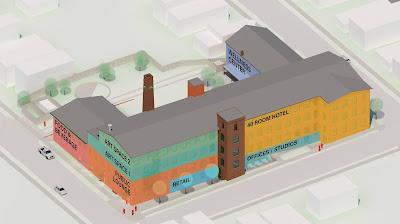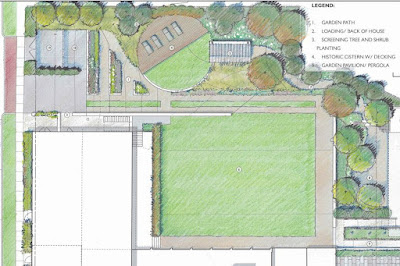It was thought that, after completing the SEQRA process at its October meeting, the Planning Board would vote on approving the plans for the former Pocketbook Factory at its meeting last Tuesday. That, however, did not happen.
Patrick Logan, an associate with the law firm of Rodenhausen Chale & Polidoro, who was presumably standing in for Victoria Polidoro who usually serves as the Planning Board's legal counsel, presented a resolution granting site plan approval, a resolution that contained six conditions. One of these conditions presented a problem for the applicant, the one that required an easement "granting public access to open space on the property." The following is the exact wording of the condition:
Approval by the Planning Board Attorney of a declaration of easement granting public access to open space on the Property, as indicated on the Site Plan Set, for purposes of passive recreation during daylight hours, along with an undertaking from the Applicant's attorney to record the declaration as soon as the Site Plan Set is signed.
Andy Howard, attorney for the applicant, objected to the easement, declaring, "We agreed to make private property open to the public, but we never agreed to give it to the public." Logan asserted, "The board wants to ensure that there is public access to the space." Howard responded, "We don't have a problem with those conditions. We have a problem with creating a property right and filing it." He went on to say it was "unprecedented to have an easement such as this on private property." He reiterated, "We have no problem with a written agreement or a penalty for not complying." When Sean Roland, one of the partners in the project, spoke of the "incredible amount of money" being invested and the landscaping plan and reiterated their commitment to making the outdoor space accessible to the public, Larry Bowne, who was chairing the meeting, retorted, "Kumbaya statements are not enforceable."
There was some discussion of a temporary easement, and in the end it was decided that Logan and Howard would "work out the details of some kind of easement agreement." It was suggested that the agreement should be crafted in time for the Planning Board's special meeting next Thursday, November 18, so that the board could vote on approving the project at that time.
COPYRIGHT 2021 CAROLE OSTERINK



The Planning Board is so far out of touch with reality, economics, what is required to develop property, and the context in which it operates. It's simply stunning to me that the PB members continue to act as if they know what they are doing when all evidence is clearly to the contrary.
ReplyDeleteThe PB members might be interested to note that I, along with other local attorneys, advise our clients that investment in Hudson is problematic because the PB behaves in a completely sui generis manner. And it's why I refuse to represent clients before the PB as it's presently constituted. It's a circus full of clowns.
Nothing that Larry said seems outrageous to me, and I can think of several instances where I've seen applicants before the Planning Board make vague promises about (mostly restaurants about sound) that they clearly have no intention of closely adhering to. If it's not in writing, what's the point?
DeleteAndy Howard is also right-this is private property, and the applicant is making significant investment.
And the two sides are hammering something out like reasonable adults do. No buying off public officials, no lawsuits or efforts to circumvent the City's waterfront zoning, no disinformation campaigns about gravel trucks. Seems better than I've seen other applicants behave recently.
Nothing?! He asked for an easement -- that's a degree of ownership. That's not just outrageous, it's fucking outrageous.
DeleteYou are more familiar with the process and legalities than I, but Larry only asked to memorialize the applicant's stated intent to allow public access to open space on the property. What good is this process if it's just a kabuki dance of virtue signaling? This is supposed to be a review process, not a marketing presentation.
DeleteJust a writing filed in the county clerk’s office memorializing public rights to private land — that is a transfer of ownership rights. Frankly the sponsors are mistaken with the while “public access” idea: it ain’t Rock Center — they’re not taking ownership of public thoroughfares.
DeleteYou put conditions on the resolution approving the site plan (the PB has routinely done this in the past). The PB has never asked an applicant to grant the City an easement. Easements run in perpetuity; businesses do not. You don’t burden real property in perpetuity to enforce a PB condition.
DeleteThanks both for for the clarification on terminology.
DeleteSounds unconstitutional to me. Imagine buying a house then having a city agency demanding an easement to let everyone on the block hang out in your backyard having barbeques. If the city wants to make private property into a public park they should buy it when it's for sale. Last I looked the playgrounds and land owned by HHA, the Terraces and Skyler Court isn't open to the public, so this only applies to the upper class?
ReplyDeleteSo long as we are going this way how about a sliding scale for property and school taxes based on income. The more you make, the higher your taxes. If you are low income, your taxes get reduced. Low income tax vouchers paid for by the rich and the lodging tax, now that's a plan to vote in ASAP before January 1!
Such a plan might indeed solve some problems. But property taxes are not actually set by municipalities. They're set by the NYS Office of Real Property Services which determines the only approved methodology for assessing and levying tax on real property.
DeleteProperty taxes are already progressive in that they tax those who own expensive homes more than those who do not.
DeleteRapidly increasing property values can create untenable situations for retired residents on a fixed income who would like to stay in the homes they purchased long ago. The folks who are in this situation also tend to be extremely wealthy on paper given the value of their home, even if their incomes make their taxes unaffordable. Some might say that people in that situation should sell their expensive asset, but society has long acknowledged that homes are somewhat different than other sorts of assets and that some affordances should be made to help people stay in them.
The practical problem with schemes like this for property taxes is that many very wealthy business owners also have low or no income but lots of wealth tied up in assets. See Elon Musk for an extreme and well publicized example ( https://thehill.com/changing-america/respect/equality/558352-elon-musk-explains-his-extremely-low-tax-rate ), but many others who can afford their taxes (like T. Eric Galloway!) likely have similar structures. One imagines that most property developers in town likely have low "incomes" in many years depending on how they've structured their businesses for tax purposes.
Nathan
Not Peter Meyer
Not Victoria Woodhull
Rising property values do not increase property taxes in and of themselves. Property tax calculations are multivariate and assessed value is only one of the variables. In a market such as the present one, where all property values are rising essentially on the same tide, absent an increase in municipal spending, property taxes will remain essentially the same.
DeleteI do not have any data, but if I had to guess I imagine that housing prices have been rising faster in Hudson proper when compared to the rest of the HCSD or the rest of the county.
DeleteIt's a good point about assessments generally though.
You are correct, Woodhull, but since our assessor does such an awful job updating market values equally every year the state keeps reducing our equalization rate, thus increasing our rate vs other municipalities and reducing our state funding. A deep cut issue that gets little attention, but a reason your school tax bill keeps shooting up.
DeleteSounds like a shakedown.
ReplyDelete